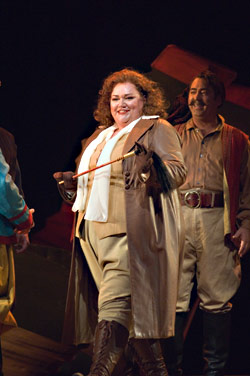Comedy is hard, says the old adage. For opera, though, this should be amended: Comedy may be hard, but audiences are easy. Operagoers are an easy sell—so accustomed to utter seriousness onstage that even shtick that’s not inherently funny becomes so out of simple incongruity. In the context of capital-G Grand capital-O Opera, just about any silliness reliably gets a laugh.
Everyone involved with Seattle Opera’s opening-night performance of Rossini’s The Italian Girl in Algiers, on both sides of the pit, surely had a great time with a production full of deft touches—most notably Robert Innes Hopkins’ set, a stage-filling pop-up storybook that opened to reveal a courtyard in the palace of Mustafa, Bey of Algiers. This 1813 opera’s been fast-forwarded to 1920, mainly to allow Stephanie Blythe, as the title character Isabella, to cut a dashing figure as an aviatrix when she drops into Algiers looking for her kidnapped boyfriend, Lindoro. Everyone looked good, in fact, in David Woolard’s splashy costumes, a bouquet of neon blues, fluorescent pinks, and a hundred shades of violet.
Contrasting with this visual dazzle, unexpectedly, were some tired comic ideas. Two of the evening’s bits of business, in particular, crop up all the time everywhere: characters breaking into dance moves (side to side across the front of the stage) or physically mimicking the music’s rhythms—”Mickey-Mousing,” they call it in the movie-scoring biz. It was surprising to see such clichés from a director, Chris Alexander, who had conceived an Ariadne auf Naxos and a Tales of Hoffmann both so vibrant that they each deservedly earned him a Seattle Opera Artist of the Year award. (To be fair, not even the high-toned Jonathan Miller avoided similar lazy solutions in his Cosi fan tutte last spring.)
Surprising, too, to see such comedic miscalculations: the staging of the Act 2 quintet, so flat in comparison to the effervescence of the music; the overextended choral bowing-and- scraping gag when Isabella’s admirer/guardian Taddeo is given the title of “Kaimakan” (don’t ask); the spaghetti-flinging brought in to rescue a finale that had run out of steam. All harmless fun, but you have to wonder if any theater audience would tolerate this sort of thing in Shakespeare or Molière, or—perhaps a more apropos comparison—in Beaumarchais or Sheridan. Or, for that matter, in the productions of the Seattle Gilbert & Sullivan Society just down the block at Seattle Rep, which regularly display an artful, notably more sophisticated comic imagination on goodness knows what teensy fraction of The Italian Girl‘s budget.
Music making at the Seattle Opera’s level, of course, is something you won’t often find elsewhere in town.One glory of Rossini’s writing for mezzo-soprano (his preferred vocal range for heroines) is that he draws dramatic effects from visceral, don’t-mess-with-me low notes as well as clarion high ones. Blythe, sounding glorious, had both, plus—the crux of the bel canto style—the ability to turn ornate passagework to expressive purpose. Rossini gives Isabella two show-off arias in Act 2: one (sung cheekily behind a screen as Blythe changed her costume) in which she evokes the aid of Venus prior to an assignation with Mustafa; the other an outburst of patriotism as she incites the chorus of slaves, all Italians, to revolt. Her handling of coloratura was as seductive in the former as it was full of panache in the latter.
William Burden, as Lindoro, provided a tenor open and ringing in the heroic Verdian mode, with the requisite Italian-style catches, scoops, and sobs in his arsenal. Baritone Simone Alberghini brought a charismatic voice and manner, and plenty of energy, to Mustafa, while soprano Sally Wolf as his discarded wife, Elvira, added a brilliant top voice to the ensembles. The usual mollifying comment about moments of stage/pit miscoordination is that they’ll work themselves out in future performances, though if conductor Edoardo Müller doesn’t ease up on some of his edge-of-singability tempos, who knows?
The Italian Girl in Algiers Seattle Opera at McCaw Hall, Seattle Center, 206-389-7676, www.seattleopera.org. $41–$135. Various days and times. Through Oct. 28.







